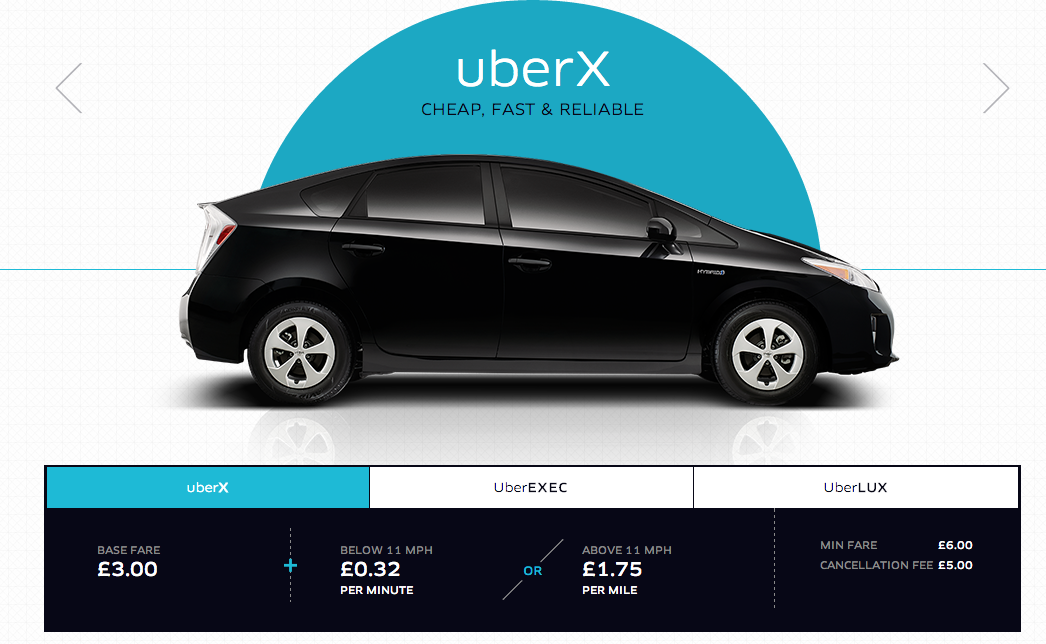If you haven’t yet heard of Uber, I probably like you. Because it probably means that you don’t follow those hideous accounts on Instagram that purport to display the world’s finest and most necessary luxuries – nobasicshitofficial & co (I don’t know since when shit that isn’t basic needed to be officialised, but there we go). Uber fits in snugly with the highest class of life that is on the same level of fundamentality as oxygen nowadays; Louboutins on your feet, holidays to Cancun, a wantrepreneur boyfriend and of course, a private driver for when you have to leave the on-finance at home so that you can drink on-credit cocktails you actually really don’t like.
For that reason and for that reason only, I decided I didn’t like Uber. Whilst I first heard about it via social media (yep, guilty), it’s recently been in the news a staggering amount. And if no news is good news, then for Uber lots of news has been bloody awful. If it’s not Uber drivers attempting to kidnap clients, it’s certainly been the on-going battle vehemently raging between Uber and the London Taxi Drivers’ Association (LTDA), which I’ll get on to shortly. But today I woke up and read that Uber has just been valued at somewhere in the region of $18.2 billion.
Sorry, let’s just wheel that: eighteen billion dollars. That’s a whole lot of zeros.
The aforementioned battle is essentially the LTDA protesting against what it is certain is an illegal taxicab service, contrary therefore to the Private Hire Vehicles (London) Act 1998 (the Act). And throughout the increasingly vicious clash taking place down on our capital’s roads, I’ve got to say I’ve been pro-LTDA. As far as I was concerned, London’s black cabs are a stalwart of British society, for decades depicted as the epitome of “English” across the globe along with post boxes, beefeaters and the Spice Girls. I’m pretty sure Americans think Lizzie hails one to take her to the local greasy spoon every Sunday before the match starts. It’s just London, all over. And then along came this outrageous and completely unnecessary competitor, with its flashy apps, chrome spokes and suited-and-booted drivers to transport the precious population of Instafamousville to whatever “private event” (read: just turn up at the door and walk straight in) they’d been invited to show their new Rick Owens off at. I also don’t like Rick Owens, but that’s beside the point. So after I had pulled on my Union Jack pants and drank my Fortnum & Mason this morning, I text one of my more learned friends to ask his opinion. And he said, “Fuck LTDA”.
Well, I didn’t expect that. Thankfully, he then explained that for years Transport For London (the government-owned body that regulates transport including black cabs in Greater London, herein “TFL”) has been ludicrously overpriced and that it was about time that somebody brought some proper – and cheaper – competition. A few Google searches later and I was rather awkwardly sat on the proverbial fence. A whole write-up later and I’m still unsure where my bottom is resting. In any case, this is said write-up (because commercial awareness).
Whober?
As I said, Uber has this weekend been valued at a phenomenal $18.2 billion. I say phenomenal because Uber is only four years old. I don’t care how much I dislike your business in principle: that is fucking amazing. It started off in San Francisco in 2009/2010, the brainchild of three pretty smart gentlemen who had discovered this niche market. Today, Uber operates out of 128 cities in 37 countries (again, wow) and has racked up the most impressive array of investors, including Goldman Sachs and Google Ventures. Its first serious round of funding came from some Silicon Valley super angel investors in 2010; current funding stands at around $49.5 million. In short, it’s not exactly a small fish.
Uber entered the London market in 2012 and, importantly, immediately became a licenced Private Hire Operator. It initially offered a fleet of Mercedes Benz, BMWs and Jaguars; more recently a new line – “Uber X” – allows clients on the lower end of the alphabetical list of famousness to be more frugal with their private driver hire and arrange to be picked up by something more modest.
It’s certainly not alone in what has arguably become a fabulously successful industry (137,000,000 Americans have the Uber app); you may have heard of similar companies including but certainly not limited to Hailo, Lyft and Addison Lee. These “transportation network companies” (TNCs) all work because of one thing: smartphones. To use Uber, you have to download an app that “connects” you to a driver near to you, as well as having other functions. And realistically, it’s only thanks to the new wave of luxury living drowning social media users that private driver hire has become such an integral facet of The Good Life, again all boxed up and at your fingertips so long as your iPhone’s in your hand.
What’s the problem?
In a nutshell, LTDA aren’t happy that they can’t compete with the new alpha male on what used to be very much their turf. And like I said, at first I just felt sorry for them. Of course you’d rather rock up in a pretty S-Class than you would a battered old black cab that smells of Eastenders and the dignity someone lost on Leicester Square the night before. But you just shouldn’t, just because it’s this our England (one for the Trusts & Equity students). The same way you’d go to Camden and eat what probably isn’t chicken served to you in what is probably an unwashed tin container over going to eat at some fancy French get-up on South Bank. It’s just what you do. I feel like Bridget Jones or something right now but again, I’ve got my Union Jack pants on so deal with it.
But on a serious note, the issue is one of a legal variety (collective yaayyy…). The LTDA contest the legality of the way that Uber and friends operate, arguing that the app is designed to simulate a taximeter in order to calculate fares. According to the Act (a PHV is a Private Hire Vehicle):
Curiously TFL has decided that the app does not constitute a taximeter, although has also recently begun to apply for a high court order to settle the matter following protests from LTDA. So, is it a taximeter for the purposes of S. 11 (3)? If we head to Uber’s website, we get this:
The fares are all set out beforehand, but you still need a device to actually calculate the final price of the journey. That device is the driver’s phone, complete with the Uber app, which realistically works in the same way as a taximeter does. So why did TFL say it’s not a taximeter? In published guidance, they clarified the situation like so:
“Smartphones used by private hire drivers – which act as GPS tracking devices to measure journey distances and relay information so that fares can be calculated remotely from the vehicle – do not constitute the equipping of a vehicle with a taxi meter.”
It’s the “calculated remotely from the vehicle” bit that matters: because the phone is not attached to the car but to the driver in a manner of speaking, the use of the app doesn’t contravene S. 11 (1) of the Act – in particular where it speaks of vehicles being “equipped with taximeters”.
But that’s just my conclusion, based on legislation and various articles. Time will tell what the high court holds.
All that glitters
… Is not necessarily a profitable venture. For whilst the founders of private driver companies such as Uber might currently be sitting on a vast and wealthy empire, the people behind the wheels on the streets aren’t all raking in serious amounts of cash. Which kind of flipped the mental image I had of this huge sedan-driven company crushing poor defenceless hackney carriages whilst transporting Z-listers up and down Oxford Street. According to one article, Addison Lee drivers must work some 12 hours a day just to be able to keep above the waterline, mostly as a result of high vehicle hire and maintenance costs, as well as obligatory insurance. Not only that but the partnering of Addison Lee with a number of big companies means that many jobs are put on tab so to speak – meaning drivers don’t see cash up front. As my learned friend suggested earlier, the app-driven services do indeed offer cheaper services than regular taxis – up to 30% cheaper, says Uber. This is evidently great for clients, but when it comes to some drivers it would seem that the margins just aren’t feasible. The situation isn’t quite the same with Uber though, mostly due to the fact that the majority of drivers actually own their own cars, knocking down overheads.
What’s the future of Uber?
Well, that depends on where in the world you are based. The high court decision in the UK will affect all cities, so that’s one to watch out for. Head over the pond and the California Public Utilities Commission has recently created a new category of transportation services to accommodate such companies – the TNCs – much to the dismay of traditional taxi company owners, no doubt. As for the rest of Europe, we seem to be generally favourable to Uber-esque services except for in Brussels where they are seemingly akin to slapping the Pope’s mother. In the midst of a protectionists v. competition verbal boxing match, the Commercial Court ruled that the ride-sharing service Uber Pop would not only be banned, but that violations of the order could amount to a €10,000 fine. Levels.
But in general, it doesn’t look like cyber peer pressure to sleep on a mattress of rubber band banks is taking a hiatus any time soon. I still feel sorry for the taxi drivers of London who realistically have no way of competing against what isn’t just a company ethos but an evolution in society. But I do grant that an industry in which competition is routinely ousted isn’t really an industry at all, but a monopoly (and God forbid that monopoly finds itself in the hands of a government-owned outfit). Founder Travis Kalanick wrote on the company’s blog a couple of days ago that Uber is “changing the fabric of” the 128 cities it operates out of today. I find it hard to disagree, if not only because society is too changing the fabric of the clothes it sports. And they reek of Rick bloody Owens.
[youtube https://www.youtube.com/watch?v=gJLIiF15wjQ&w=420&h=315]



them0rris
Just a little update from me: since yesterday, I’ve had quite a few readers and some constructive responses. A couple were pro-Uber, not because they’re “bout dat life” but because it is definitely a lot cheaper and user-friendly than traditional taxis (Uber X at least). So it’s understandable why that’d be your first choice of transport. On the other hand, I had more than a few disgruntled taxi drivers (none of whom had apparently read this in its entirety as I was definitely on their side!) who were simply angry about the situation in general. Gentlemen (and ladies), whilst I can understand that what you’re experiencing is frustrating, you must lay down your weapons and put on your thinking caps. You may feel betrayed by Hailo, but can you blame them for simply adapting to survive? Moaning and vandalism isn’t going to help you to remain a serious competitor in a sector that is becoming increasingly hard to function in. Now I’m all for the Hackney carriage. But I’m not for self-made martyrs. I suggest you remove the idiotic bullies from your front line and replace them with somebody with a little more… Gumption.
CM